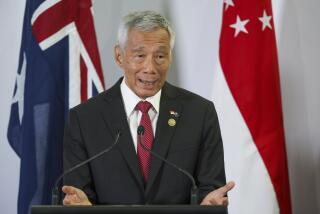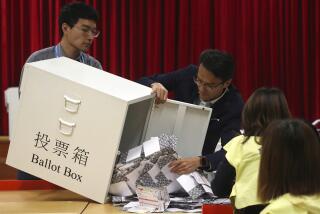ASIA : Hong Kong Governor’s Reforms Hit Great Wall
- Share via
HONG KONG — In barely three months on the job, Hong Kong’s newest--and last--British governor, Chris Patten, has managed to rid the colony of much of its stuffy official pomposity.
Unlike his seldom-seen predecessors, Patten has traversed Hong Kong meeting ordinary people, and his common touch has shot him to the top of the popularity polls.
But the honeymoon may be over. This week, the former British politician unveiled his blueprint for Hong Kong’s last five years as a colony--proposed democratic reforms that the Chinese government promptly denounced.
The day after Patten’s maiden speech to legislators, a spokesman for the Chinese Foreign Ministry said that Patten’s constitutional proposals would block a smooth transition to Chinese sovereignty in 1997, in accord with principles laid down in the 1984 Sino-British joint declaration. China’s rebuttal could create a period of nervousness among the Hong Kong people, who feel that Patten will have a difficult time winning Beijing’s support of his blueprint--particularly proposals to quicken the pace of democracy before 1997.
Patten gave Hong Kong citizens the chance to question his ideas in a public forum Thursday, during which several expressed their concern over China’s reaction to his proposed constitutional changes. “I don’t want to see you make a mess of Hong Kong,” one man said. “Looking back in history, we can see that every time the British have retreated from their colony, there was trouble.”
In reply, Patten said the proposals for discussion with China were entirely consistent with the joint declaration and the so-called Basic Law, Hong Kong’s post-1997 mini-constitution drawn up by China.
The crunch issue is how to elect Hong Kong’s Legislative Council after 1995. Up to now, both Britain and China have valued the notion known as the “through train,” under which legislators elected in 1995 would remain on the Legislative Council through the transfer of sovereignty to China in 1997 and up to 1999. The Chinese, however, interpret this concept as giving them a veto over the council’s composition.
“The pace of democratization in Hong Kong is--we all know--necessarily constrained,” Patten said in his speech to lawmakers. “But it is constrained, not stopped dead in its tracks.”
One of Patten’s ideas that is expected to strengthen grass-roots democracy is the direct election in 1994 of all district board and municipal council members. He has also proposed a clear separation of powers between the Executive Council, his top advisory body, and the Legislative Council. Patten said this change would allow the Legislative Council to develop into a more mature, representative body to which he would be accountable through regular question-and-answer sessions with lawmakers.
This proposal would allow the governor to avoid the problem of bringing Martin Lee, the influential chairman of the liberal United Democrats party, who is labeled a “subversive” by Beijing, onto the Executive Council. Lee, whose United Democrats won most of the directly elected seats in last year’s legislative elections, has called the proposal to separate the two councils “a retrograde step.” He accused Patten of forming “a benign dictatorship” by not appointing any popularly elected official to the council.
But Patten appears not to be easily intimidated. Last month, for example, he voiced frustration over “endless discussions” with China over Hong Kong’s $14.5-billion airport project. China has harped on the project’s cost, expressing concern that it will deplete Hong Kong’s resources while rewarding British contractors. Without Beijing’s support, Hong Kong cannot arrange financing, which has led to a deadlock.
Meanwhile, Patten’s proposed sweeping increases in public spending, from welfare to the environment, are also likely to be opposed by Beijing.
Tsang Tak-sing, chief editor of the pro-China newspaper Ta Kung Pao, said Patten will have to be willing to make concessions in his proposals when he meets with Chinese officials during an official visit to Beijing on Oct. 21-23.
Patten is likely to have a lot of explaining to do, in particular about his proposed democratic reforms, in both China and Hong Kong.
More to Read
Sign up for Essential California
The most important California stories and recommendations in your inbox every morning.
You may occasionally receive promotional content from the Los Angeles Times.










